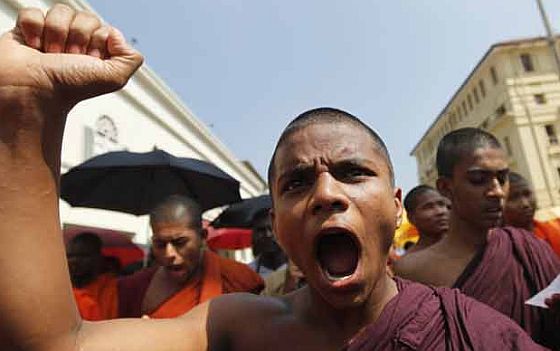“For the record, I do not believe it would be constitutional for the government to target and kill any U.S. citizen — with a drone, or with a shotgun — without due process, nor should any President deploy armed drones over U.S. soil.”
In saying this during his speech yesterday at the National Defense University, Barack Obama was following the lead of his political mentor, George W Bush. Which is to say: in anticipation of the possibility that either president might at some point in the future face prosecution for crimes such as murder or torture, each has wanted to present himself as having acted in good faith while following the advice of their legal counselors.
Obama is treating “due process” as a term that can be applied in whatever novel way his administration determines it can be used. His idea of due process amounts to nothing more than a process of review, yet in the US legal system it has quite specific elements — none more important than the principle that someone accused of a crime is entitled to a defense.
Who served as Anwar Awlaki’s defense counsel before Obama decided to execute him? He had no defense. He had no due process.
In his speech, Obama made a string of accusations about Awlaki and presented them all as though they were indisputable facts. Where’s the evidence? And why should the evidence be regarded as credible if no one reviewed it other than Awlaki’s de facto prosecutors?
A New York Times editorial said: “The acknowledgment of the killing of Mr. Awlaki in 2011, and, more important, the supplying of compelling evidence that he was organizing terrorist attacks and not just preaching jihad on the Internet, was a much-needed step.”
Have the editorial writers seen this “compelling evidence” or are they, like many other journalists, making no distinction between references to evidence unseen, and the evidence itself. In other words, are they accepting the president’s word on blind faith?
Obama says he’s declassified this action, yet the documentation will most likely remain heavily redacted and the declassification thus amount to nothing more than a PR exercise.
[B]efore any strike is taken, there must be near-certainty that no civilians will be killed or injured — the highest standard we can set.
Now, this last point is critical, because much of the criticism about drone strikes — both here at home and abroad — understandably centers on reports of civilian casualties. There’s a wide gap between U.S. assessments of such casualties and nongovernmental reports. Nevertheless, it is a hard fact that U.S. strikes have resulted in civilian casualties, a risk that exists in every war. And for the families of those civilians, no words or legal construct can justify their loss. For me, and those in my chain of command, those deaths will haunt us as long as we live, just as we are haunted by the civilian casualties that have occurred throughout conventional fighting in Afghanistan and Iraq.
In June 2011, when John Brennan — at that time Obama’s chief counter terrorism adviser — said that for ‘almost a year’ no civilian had been killed by drone strikes in Pakistan, he didn’t sound like a man haunted by civilian casualties; he sounded like a government official who believed he could lie with impunity. His ability to tell straight-faced lies is perhaps what made Obama think that Brennan was best qualified to become the head of the CIA.
An editorial in The Guardian says:
The speech is an attempt to invite the final curtain down on a calamitous and bloody decade-and-a-half of warfare. But the battles themselves will continue, and Mr Obama has not resiled from the past. He has largely tried to justify it.
Mr Obama’s second attempt to shut Guantánamo Bay is also studded with ifs and buts, particularly his call on Congress to allow the transfer of some of the detainees to a site in the US. Much though the words are welcome, this commander in chief’s actions will never match the expectations that he, as president, arouses in his speeches. He will restrict drones, but targeted killings are here to stay.
In the fifth year of his presidency, we should be well past the point where we naively entertain the hope that any speech Obama delivers might represent a “momentous turning point” (as the New York Times dubbed yesterday’s speech).
If Bush was the reckless “decider,” Obama can be seen as the dispassionate “observer” — the man whose speeches persist in sounding like a wishlist of the things he would do if he was president.





